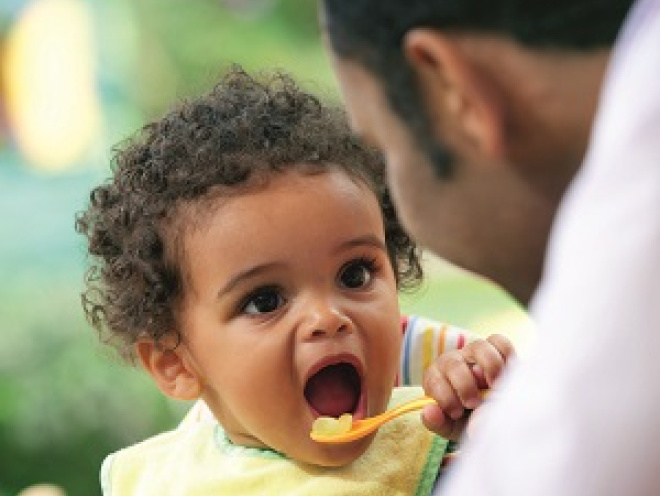Baby Spitting Out Food: Why It Happens and What You Can Do
Watching your little one effortlessly expel a mouthful of food can be a startling experience for new parents. While it might appear concerning, spitting up, also known as reflux, is a normal and frequent occurrence in babies, especially during their first year. This article delves deeper into the reasons behind baby spit-up, explores when it might be a cause for concern, and provides practical tips for managing this messy but temporary phase.
Unraveling the Mystery of Baby Spit-Up: Common Causes
Several factors contribute to why babies experience frequent spit-up:
- Immature Digestive System: A newborn’s digestive system is still under development. The muscular valve (lower esophageal sphincter) separating the stomach and esophagus is immature and weaker, allowing some food and stomach acid to flow back up, causing spit-up.
- Small Stomach Capacity: Compared to adults, babies have tiny stomachs. Overfeeding, even by a small amount, can easily overwhelm their digestive system, leading to spit-up.
- Air Swallowing: During feeding, whether through breast or bottle, babies can inadvertently swallow air. This air gets trapped in their stomach, causing discomfort and pressure, eventually leading to spitting up.
- Movement and Activity: Rolling, bouncing, or active play, especially soon after feeding, can jostle your baby’s stomach and contribute to spit-up.
- Introduction of Solid Foods: When transitioning from solely breast milk or formula to solid foods, babies are still learning how to eat and swallow effectively. Some experimenting and occasional spit-up are normal during this learning phase.
When to Differentiate Between Spit-Up and Reflux: Knowing the Signs
While most cases of baby spit-up are harmless and resolve on their own, it’s crucial to be aware of signs that might indicate a more serious condition called gastroesophageal reflux disease
-
Forceful Vomiting: If your baby’s spit-up is forceful or projectile, causing distress and discomfort, it might be a sign of GERD.
-
Poor Weight Gain: If your baby consistently misses key growth milestones or displays inadequate weight gain, it could be indicative of an underlying feeding issue related to reflux.
-
Blood or Green Bile: Blood in the vomit or the presence of green bile can signal a more serious medical concern and requires immediate medical attention.
-
Refusal to Eat: If your baby persistently refuses to eat or shows signs of discomfort or pain during feeding, it’s essential to consult your pediatrician to rule out any underlying issues.
Strategies to Minimize Spit-Up: Making Adjustments for a Smoother Journey
Here are some practical strategies you can implement to help manage and potentially minimize spit-up in your baby:
-
Smaller, More Frequent Feedings: Instead of large, infrequent feedings, opt for smaller, more frequent feedings of breast milk or formula. This allows your baby’s stomach to handle smaller quantities more effectively, reducing the risk of overfilling and subsequent spit-up.
-
Burping Frequently and Effectively: Burping your baby during and after each feeding helps release any swallowed air that might contribute to discomfort and spit-up. Hold your baby upright against your shoulder and gently pat their back until you hear or feel a burp.
-
Upright Positioning After Feeding: After feeding, keep your baby upright for 20-30 minutes. This allows the milk or formula to settle properly in their stomach, minimizing the chances of it flowing back up. You can use a sling or carrier, hold them upright on your lap, or prop them up on an incline (always supervised and with proper support).
-
Loose Clothing is Key: Avoid dressing your baby in tight-fitting clothing, especially around the abdomen, as this can put unnecessary pressure on their stomach and potentially worsen spit-up. Opt for looser-fitting outfits that allow for comfortable breathing and movement.
-
Slow and Steady Bottle Feeding: If bottle-feeding, use a slow-flow nipple and pace the feeding, allowing your baby to take breaks and swallow properly. This helps prevent them from swallowing too much air or overfeeding, both of which can contribute to spit-up.
-
Proper Latching During Breastfeeding: For breastfed babies, ensuring a proper latch is crucial. A good latch not only promotes efficient milk transfer but also helps prevent air intake, which can lead to spit-up. Consult with a lactation consultant for guidance on achieving and maintaining a proper latch.
-
Delay Playtime After Feeding: Avoid engaging your baby in active play or vigorous activities immediately after feeding. Allow some time for their food to settle in their stomach before playtime to minimize the risk of spit-up triggered by movement.
Dealing with the Mess of Spit-Up: Practical Tips and Cleaning Solutions
While you can’t completely prevent spit-up, you can certainly be prepared for it and manage the mess effectively. Here are some handy tips:
-
Invest in Burp Cloths: Burp cloths are your best friend during this messy phase. Keep several readily available, preferably made of absorbent and soft material to comfortably wipe up spit-up without irritating your baby’s delicate skin.
-
Embrace Bibs: Bibs are another essential tool for managing spit-up. Use bibs not only during feedings but also throughout the day to catch any unexpected spills or dribbles. Choose bibs made of waterproof or wipeable materials for easy cleaning.
-
Dress for Easy Cleaning: When choosing clothes for your baby, prioritize comfort and ease of cleaning. Opt for machine-washable and quick-drying outfits in case of frequent spit-up incidents. Consider using bibs or clothing protectors for extra coverage.
-
Protect Furniture and Surfaces: Cover furniture and carpets in areas where your baby spends time with washable blankets or sheets. This helps protect your belongings from potential mess and makes cleaning up easier.
-
Cleaning Up Spit-Up: When dealing with spit-up, act quickly to prevent stains and odors. Blot up the excess with a clean, absorbent cloth and follow up with a gentle wipe using warm water and mild baby soap. Avoid harsh chemicals or rubbing, as these can irritate your baby’s skin.
When Does Spit-Up Become a Thing of the Past? Finding Solace in the Timeline
For most babies, spitting up peaks around 4-6 months of age. As their digestive system matures and strengthens, the frequency and volume of spit-up gradually decrease. By the time your baby reaches 12 months, frequent spit-up typically becomes a thing of the past.
However, it’s important to remember that every baby is unique. While the timeline mentioned above provides a general guideline, some babies might experience spit-up for a longer duration. If you have any concerns about the frequency or severity of your baby’s spit-up, or if it seems to be accompanied by other symptoms, always consult your pediatrician for personalized advice and guidance.
Conclusion
While spit-up can be a messy part of early parenthood, it’s usually a harmless and temporary phase. With patience and a few simple strategies, you can navigate this stage while ensuring your baby receives adequate nutrition. Remember, if you have any concerns about your baby’s feeding, growth, or development, don’t hesitate to talk to your pediatrician.

